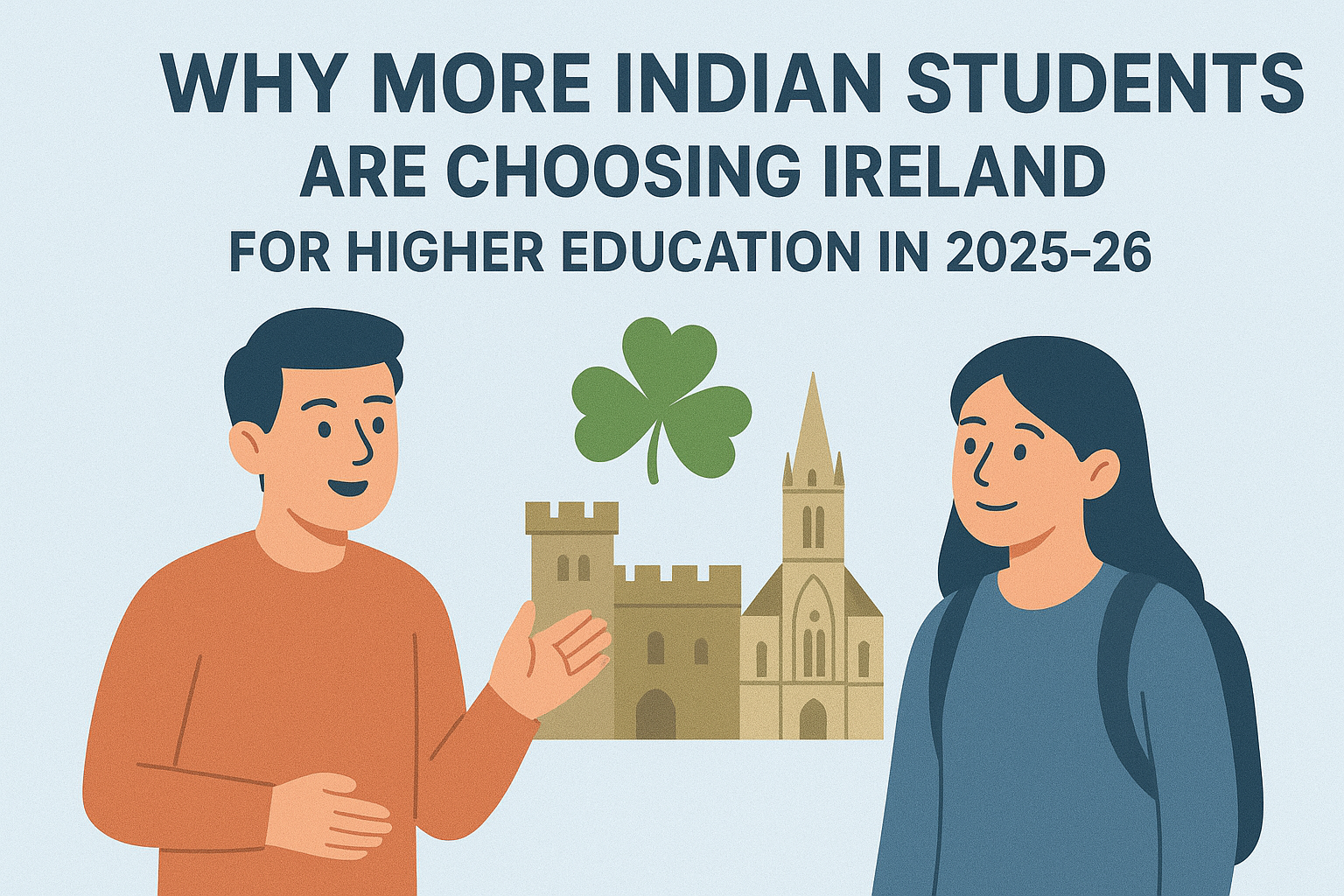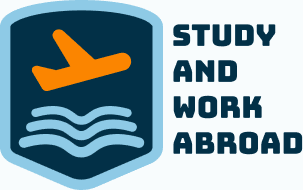Call Us:+91-9920234749, +91-9833420909 info@studyandworkabroad.in

Why More Indian Students Are Choosing Ireland for Higher Education in 2025-26
Studying abroad is a life-changing decision. In 2025-26, more Indian students are looking beyond the usual destinations like USA and Australia, and choosing Ireland. What’s driving this shift? From cost benefits to post-study work opportunities, Ireland is emerging as a top choice. Let’s dive into the real reasons, the latest updates, and what you must know if you plan to study in Ireland.
What Makes Ireland a Growing Favorite
Several factors make Ireland attractive for Indian students right now:
- English-speaking, EU location: Ireland is one of the only English-speaking countries in the European Union, which means easier adaptation, and the benefits of being in Europe.
- Strong job market & global companies: With companies like Google, Meta, Apple, Microsoft, and many pharma/medtech firms having major operations in Ireland, students have good chances of internships and placements.
- Stable student policy environment: Irish immigration and education authorities have relatively stable rules, with attractive post-study work options and fewer sudden crack-downs compared to some other countries.
Key Updates & Changes for 2025-26
Here are what’s new and important:
- Post-study work visa (Graduate Scheme): Students completing eligible higher education programs (especially master’s) can get up to 2 years stay-back to look for work.
- Tuition & living cost trends: While living in Dublin remains expensive, costs are still generally lower compared to many UK cities or comparable universities in Canada/USA. Tuition fees and living expenses have crept up a bit, especially in major cities. Smaller Irish towns or less central campuses are more affordable.
- No cap on international students: Ireland does not impose major quotas on international student admissions, which gives more flexibility.
- Visa stability & easier test options: TOEFL, IELTS are accepted; there are simplified processes in many universities for English language proof and financial documentation.
Costs: What You Need to Budget For
Understanding the cost is crucial. Here’s a breakdown for Indian students:
| Expense Type | Approximate Cost (2025-26) |
| Tuition Fees (Undergraduate) | €9,000 – €25,000 per year depending on university & program. |
| Tuition Fees (Postgraduate / Master’s) | €10,000 – €27000 per year (some programs like MBA or specialized courses may cost more). |
| Living Expenses (including accommodation, food, transport etc.) | €8,000 – €12,000 annually (higher in Dublin; lower in smaller cities). |
| Visa + Other Pre-Arrival Costs | Visa fee ~ €60 for D-type student visa, IRP (residence permit) ~ €300, medical & insurance costs as well. |
What Indian Students Need to Know: Requirements & Process
To study in Ireland, you’ll need to follow certain steps and meet specific criteria:
- Admission offer from a recognized full-time course: Only certain institutions and programs qualify under Irish immigration rules.
- D-type Student Visa: For programs longer than 90 days, Indian students need a long-stay D-visa. Proof of funds, fee payment, English proficiency, valid passport etc. are required.
- Proof of Funds: Besides tuition, you’ll need to show you have enough money to cover living expenses. Usually, access to €10,000 when you arrive is required.
- English Proficiency: IELTS / TOEFL / PTE are accepted. Some universities may accept home-edition scores or alternate proofs.
- Work While Studying: Students with Stamp 2 permission can work up to 20 hours/week during term, and more during holidays.
Pros & Cons: What to Think About
Every destination has trade-offs. Here are what you get vs what to watch out for in Ireland.
Pros
- Shorter master’s programs (often 1 year) → Less tuition/time.
- Strong exposure to Europe, easy travel and diverse culture.
- Good job opportunities especially in tech, pharma, finance sectors.
- Stable immigration policies and friendly environment for international students.
Challenges
- Cost of living in cities like Dublin is high. Rent is steep, so budget accordingly.
- Accommodation shortages sometimes lead to high rent or long commute.
- No dependent visa in many cases for non-Research programs (spouse/family stay) unless under certain permits.
- Permanent Residency (PR) is not as straightforward—time working under relevant permits helps, but studying time itself may not count directly in some cases.
Scholarships and How to Save Money
To reduce costs, Indian students can use several strategies:
- Apply for Government of Ireland International Education Scholarship and other merit-based scholarships at universities like UCD, Trinity, UCC etc.
- Choose smaller cities or less central campuses—rent & living costs are lower.
- Share accommodation or use student housing/university dorms.
- Work part-time when permitted. Helps with daily costs.
- Apply early (both for university & visa) to avoid rush fees and expensive last-minute accommodations.
Why India → Ireland Shift Is Strong in 2025-26
Putting it all together:
- The rising fees and living costs in the US and some other destinations have made Ireland relatively more affordable.
- Ireland’s post-study work visa policies are more student-friendly in many cases, especially for master’s students.
- The presence of global tech & pharma companies means good internship and job prospects.
- Stable regulation and welcoming environment reduce uncertainty-risk for students and parents.
FAQ
Q: How long does Ireland’s student visa process take?
A: It typically takes about 4-8 weeks after submitting a complete application. But delays can happen, especially during peak intake periods.
Q: Is there a minimum bank balance required?
A: Yes. Usually, proof of tuition deposit plus living expense funds (~€10,000) is needed. Documents like bank statements, sponsor letters, or loan sanction letters are used.
Q: Can I bring my family (spouse/children)?
A: For most student permits (Stamp 2), dependent visas are generally not allowed, except under specific categories (like PhD or critical skills).
Q: How many hours can I work during my studies?
A: Up to 20 hours per week during term time, and more during holidays.
Conclusion
Ireland is quickly becoming one of the most preferred destinations for Indian students for 2025-26. With reasonable tuition fees, good post-study work options, an English-speaking environment, and stable immigration policies, the risk-vs-reward balance looks strong.
If you’re considering studying abroad, Ireland deserves serious attention especially if you want quality, career opportunities, and fewer surprises.



